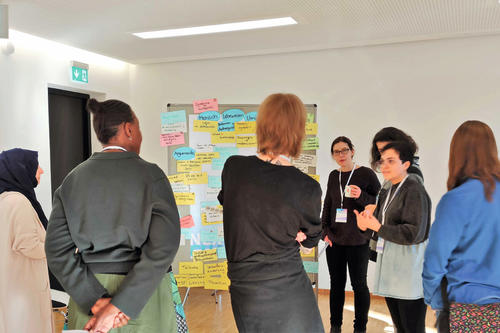Valuable Sources of Knowledge from Society – How Civil Society Stakeholders become Partners in the Epistemological Process in BUA Research Projects
Discussion – an important element of transdisciplinary exchange Image credit: FREIHEIT Gruppe Interdisziplinäre Medienproduktion GmbH
Image Credit: Image credit: FREIHEIT Gruppe Interdisziplinäre Medienproduktion GmbH
Current studies on participation in research and BUA-funded projects such as "Beyond Social Cohesion – Global Repertoires of Living Together" show that in new forms of knowledge production and dissemination, people become partners in the epistemological process. The BUA has therefore found the topic for the Next Grand Challenge in a participatory process.
Click here to go directly to the Next Grand Challenge!
To the press release of the Next Grand Challenge
Whoever wants to create knowledge, can no longer just work in laboratories or libraries. Other knowledge resources – for example from professional practice or the wealth of experience of civil society – are necessary to conduct excellent research. In numerous projects of the Berlin University Alliance with its partner institutions Freie Universität Berlin, Humboldt-Universität zu Berlin, Technische Universität Berlin, and Charité – Universitätsmedizin Berlin, science and society mutually benefit from processes of so-called "transdisciplinary research": complex issues are viewed and analyzed from vastly different perspectives and stakeholders who are sometimes neglected in societal decision-making and design processes are given a voice. Surprising solutions often emerge in the joint learning process.
The Berlin University Alliance funds transdisciplinary research projects, such as the project "Social cohesion, food and health. Inclusive food system transitions". Here, excellent scientists and scholars, supported by civil society stakeholders, are investigating, among other things, initiatives to build regional value chains, with great success. The associated conferences naturally bring together stakeholders from academia, business, politics, and civil society.
In order to promote transdisciplinarity, i.e. exchange across the boundaries of disciplines and science, the Berlin University Alliance also brought academics and public figures such as Prof. Dr. Christian Drosten from Charité – Universitätsmedizin Berlin or Chris Patten, Chancellor of the University of Oxford and former EU Commissioner as well as ARD London correspondent Annette Dittert into conversation as part of the Oxford Berlin Research Partnership. At a symposium at the Berlin-Brandenburg Academy of Sciences and Humanities in 2022, they discussed how complex issues can be communicated on the Internet in times of hate speech. In addition, the BUA has set up its own competence centers to promote exchange across disciplinary and scientific boundaries, even away from prominent podiums:
The Expertise and Knowledge Exchange Office (KnEx) teaches in workshops and lectures how multilateral knowledge exchange can also succeed on an institutional level. The Research Forums strengthen transdisciplinary research by testing new methods of transdisciplinary research in innovative formats. And in the experimental science communication laboratories, research groups use elements of the theater or gaming to develop new exchange formats for target groups that have been poorly covered so far, their goal being to develop science communication that not only carries knowledge to society but also concerns from society to science. This is necessary in a rapidly changing society in order to find scientifically sound and socially accepted solutions to global challenges. For the Berlin University Alliance, it was therefore clear that individuals and groups from civil society should be involved in the selection and implementation of the next inter- and transdisciplinary research program, the Next Grand Challenge.

